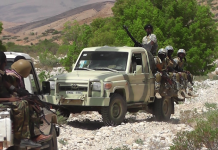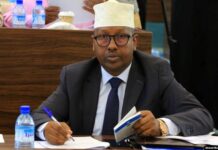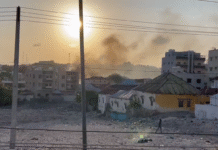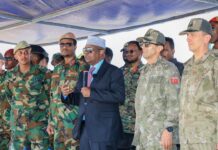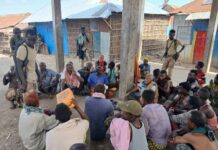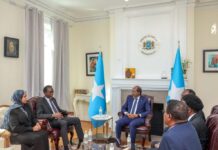MOGADISHU, Somalia
Every dollar sent as remittances counts in Somalia. But since the Donald Trump-led administration imposed tough new measures on the Horn of Africa country, Somalis have been complaining it is becoming increasingly cumbersome to send money home.
A dollar sent from the U.S. can get a family in Somalia a kilo (2 pounds) of rice. With $5, they can afford an 11-kilogram bag of flour. And, if a Somali migrant in the U.S. sends between $100 and $150, it is enough to feed a family of eight in an internally displaced people camp.
Asma Ahmed, a mother-of-eight from the Mudug region in north central Somalia that has been severely affected by drought, told Anadolu Agency she had not received remittances from her family in the U.S. due to new post-Trump restrictions.
“We lost all our livestock in the region and, shockingly, my family in America tells me they can’t send money home because of restrictions,” she said with tears rolling down her face.
Ahmed said such restrictions are only making life harder for her family as, without support from relatives abroad, she cannot afford to buy food, seek medical attention or send her children to school.
Yassen Abukar, a 63-year-old Mogadishu resident, said it was wrong to associate remittances as support for terror groups like al-Shabaab instead of seeing it as a key support system for ordinary Somalis.
“There are no jobs in Somalia,” he said. “Most of us depend on the little remittances sent to us by our families overseas. We have nothing to do with al-Shabaab.”
According to the World Bank, Somalia earned $1.4 billion in remittances in 2015, which equated to 23 percent of GDP.
Mogadishu-based political analyst Mohamed Alim said money from overseas were a “lifeline” for most Somali families.
– Restrictions on Somalis in US
“Without these remittances, communities here would not survive, especially during this looming famine,” Alim said.
Hawo Mohamed, who is lives in Buffalo in western New York state, confirmed the new bottlenecks on Somalis trying to send money to their families.
“I tried to send money to some of my family affected by the drought in Somalia this week, but I was told the operator in Buffalo had closed shop,” she told Anadolu Agency via telephone.
Mohamed said she was told to travel to Ohio or Minnesota to send money. “I don’t know why the operators in Buffalo and neighboring Syracuse shut down,” she said. “Possibly it has something to do with government.”
According to the Somali embassy’s website in Washington, more than 250,000 Somalis live in the U.S. While some are reporting that money transfer operators in the U.S. have shut up shop, others say they have to limit their transactions to $700 a month to avoid suspicion.
Some say they risk interrogation by the police if they exceed the normal amount they usually send home or make three or more transactions a month.
“In Ohio, we can still send money but you can’t exceed a certain amount lest you create suspicion with authorities,” Farah Abdi told Anadolu Agency.
Nothing is ever easy in a place like Somalia, which has seen years of civil strife, terrorism and now drought that’s threatening to break into an all-out famine.
Millions of people have been affected. According to the UN, around half of Somalia’s population — six million people — faces the largest humanitarian crisis since 1945.
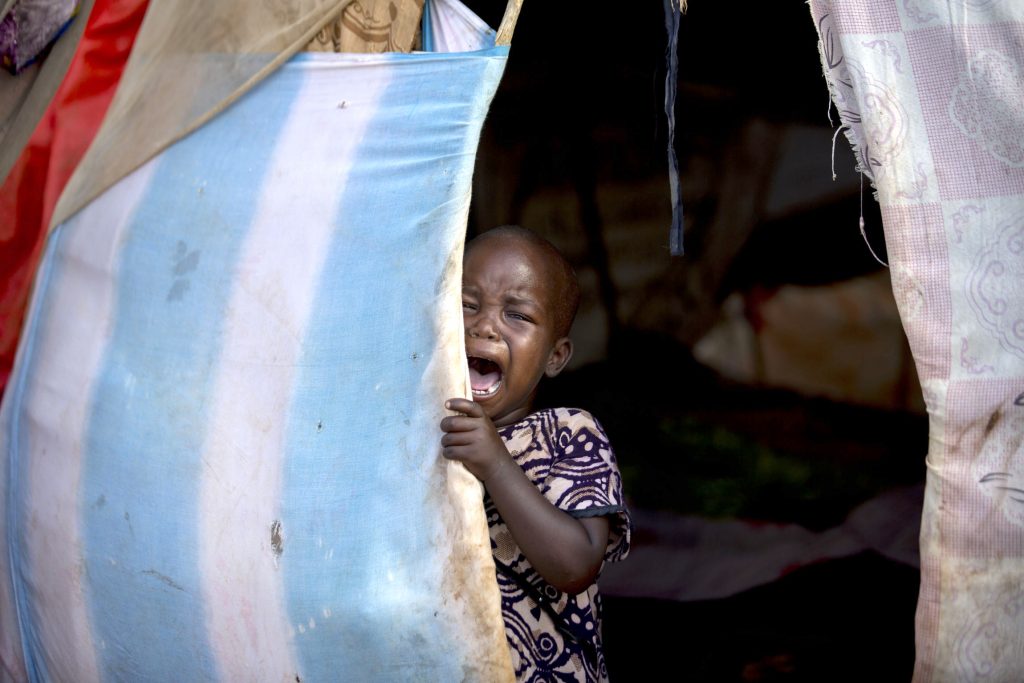
– Drought worsens
The government declared a national disaster after drought hit 11 regions, including Bay and Bakol, where at least 110 people died of hunger and waterborne diseases over 48 hours in March.
The country witnessed famine just a few years ago and Somalis now fear a repeat of 2011, when at least 260,000 people lost their lives.
Somalia has been wracked by more than two decades of civil war, a devastating result of which is that the country still lacks strong financial institutions. All monetary transactions are now done through money transfer operators, known locally as Hawala, since Western Union and international banks do not send money to Somalia.
All Hawala transactions are done in U.S. dollars. The United Arab Emirates is the financial capital for nearly all such transactions and almost all Hawala operators transfer their money through Dubai.
Somalis living abroad go to a registered Hawala agent, who charges them a fee and gives a password that is given to relatives in Somalia.
The agent in the U.S. then sends a list of names of recipients to their branches in Somalia, where the money is handed over to the beneficiaries. Recipients are expected to come with an identity card and a password to prove the money belongs to them.
Ever since the 9/11 attacks in the U.S., Hawala operators have come under exhaustive scrutiny worldwide and now all money flows are strictly monitored. While the checks are already said to be thorough, Somalis are reporting that it has become stricter since Trump came into power.
Kaisar Hajji, a resident of Minneapolis, told Anadolu Agency via telephone that while he can still send money home, scrutiny is very tight.
Previously, he could send money through a Hawala agent without showing his green card but now it has become compulsory to show a residency document, details of which are then recorded.
– Weak financial institutions
Somalis are also asked for their home address and the purpose of sending the money. Hawala owners then provide these details to the banks where they hold their own accounts.
The U.S. government has been advising Somalia on how to improve its financial institutions to avoid remittances from falling into the hands of al-Shabaab terrorists. Last year, Somalia signed into law a bill on money laundering and terrorism financing in a bid to create confidence with western governments and keep the remittances flowing.
The World Bank began working alongside the Central Bank of Somalia last year to implement a number of schemes aimed at tackling key deficiencies in the Somali financial sector.
During his campaign for the presidency, Trump warned Mexico he would stop the flow of remittances from the U.S.
While he has not threatened Somalia with such a move, Somalis fear that any further action, such as a complete ban on Hawala transactions, could strangle the flow of remittances and hit their families and the country hard.
Abdullah Mohamed Sheikh, secretary of the Somali Remittance Association, told Anadolu Agency that new restrictions in the U.S. had created delays in money transfers, which had worsened the humanitarian crisis.
“Millions of people who need assistance from their relatives abroad can’t get it on time,” he said.
Lawmaker Abdifatah Mohamed added that the restrictions were a huge concern for the Somali government. “Almost 2.5 million Somali’s depend on their families outside the country, especially in Europe and the U.S., for remittances,” he said.
Mohamed appealed to the international community to ease restrictions. saying they provided a lifeline for survival.
Source:Anadolu Agency correspondent
By Mohammed Dhaysane and Hassan Isilow


